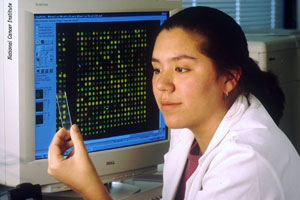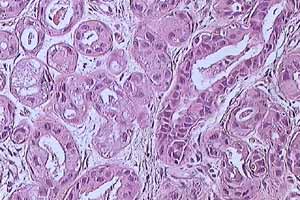This is where the newly approved genetic test can help. The FDA approved a genetic test called MammaPrint that is marketed by a Dutch company called Agendia and manufactured by a bay area company, Agilent.
 checking a microarrayThere is also another competing test made here in the bay area by Genomic Health Inc. called Oncotype DX. Although not FDA approved, the company sold over 14,000 of these tests last year.Both tests use a technology called microarrays. Microarrays are basically a way to do many genetic tests all at once on a glass slide.
checking a microarrayThere is also another competing test made here in the bay area by Genomic Health Inc. called Oncotype DX. Although not FDA approved, the company sold over 14,000 of these tests last year.Both tests use a technology called microarrays. Microarrays are basically a way to do many genetic tests all at once on a glass slide.
In this case, the tests aren’t looking at a person's genes. Instead they look at how the tumor uses its genes.
All the different kinds of cells in our body use their genes a bit differently. This is what makes a lung cell different from a liver cell, for example.
And a tumor uses its genes differently than do the kinds of cells it came from. In other words, a breast cancer cell uses its genes differently than does a normal breast cell. Why is this? Because the cancer cell’s DNA is damaged.
Cancer starts out as a cell, just sitting there, minding its own business. Suddenly, something happens to the cell's DNA.
Maybe the sun has caused a mutation in a gene in a skin cell. Or, the cell has just divided and it made a mistake when it copied its DNA. Or something in cigarette smoke has mutated the DNA of a lung cell.
Whatever caused the DNA change, this mutation in the gene has unleashed the cell’s ability to grow and divide. Usually a cell is under tight control and is only allowed to grow and divide a certain amount in certain places at certain times.
Now, because of the DNA mutation, it is free to grow, make copies of itself and possibly spread. This is the definition of cancer.
And there isn't just one mutation that causes cancer. Lots and lots of DNA changes can lead to a cell growing uncontrollably (or refusing to die). And once certain DNA mutations happen, more can happen so that by the time you notice you have cancer, there are lots of DNA changes.
So different tumors use their DNA differently. These microarray tests look at how tumors use 70 or 80 genes that can distinguish a cancer that is likely to spread from one that won't.
Now these tests aren't perfect. For MammaPrint, for example, only about one third to one quarter of women whose results indicated they had aggressive cancer actually had their cancer spread.
But as one of many tools that help doctors decide on a treatment, these tests are very powerful. And another step on the road to personalized medicine.
One day doctors may look at a patient's DNA (or the DNA of his or her tumors) and be able to give that patient personalized care. One patient will do well with one form of chemo while another may do better with a different form.
This sort of thing already happens with the drug Herceptin and certain aggressive forms of breast cancer. And with Gleevec and certain forms of leukemia. And now breast cancer has these microarray tests. Maybe personalized medicine is closer than we think.
Additional Links:
Cancer development
http://www.thetech.org/genetics/ask.php?id=136
Side effects of chemotherapy
http://www.cancer.gov/cancerinfo/chemotherapy-and-you/page4
Cancer Atlas Project
http://www.cancer.gov/newscenter/pressreleases/CancerGenomeLaunchPressRelease
Dr. Barry Starr is a Geneticist-in-Residence at The Tech Museum of Innovation in San Jose, CA.
Learn more about genetics at The Tech's online exhibition, Understanding Genetics.
 breast cancerLast week the FDA approved a new weapon in a doctor’s arsenal against breast cancer. This genetic test doesn’t help doctors find the cancer early. Or figure out who is more likely to get it. What this test does is help doctors decide whether to prescribe chemotherapy AFTER surgery. Right now doctors often recommend chemo even if all of the tumor has been removed.
breast cancerLast week the FDA approved a new weapon in a doctor’s arsenal against breast cancer. This genetic test doesn’t help doctors find the cancer early. Or figure out who is more likely to get it. What this test does is help doctors decide whether to prescribe chemotherapy AFTER surgery. Right now doctors often recommend chemo even if all of the tumor has been removed.
 checking a microarray
checking a microarray